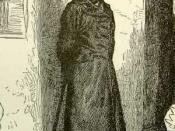Les Miserables In the movie Les Miserables Javert's legalism is very different from Valjean's Christianity. Javert always goes bye the law and Valjean goes by what he thinks is right. There are many examples in the movie to show this.
The movie starts out with Jean Valjean committing a small crime. He was sentenced to 19 years in prison for stealing a loaf of bread. This punishment did not fit his crime. After Valjean served his 19 years in prison, Valjean stole spoons from the Bishop of Diane. The Bishop forgives Valjean for his crime. This completely changes his life. Valjean becomes the mayor of the city controlled by inspector Javert. Javert was a guard at the prison when Valjean was there.
When the Valjean first came to the city he rescued a man by the name of La Fitte. La Fitte was stuck under a cart. The cart was very heavy, but being in jail all that time, made Valjean use to hard labor.
This made him able to lift the cart. This is when Javert realized that he was Jean Valjean. Javert then went to the city police and told them what he suspected with Valjean.
When Valjean was living in the town, he meets a woman by the name of Fontine. She was also known as the town whore. In this part of the movie it really snows how Javert's legalism differs from Valiean's Christianity. Javert treats Fontine very poorly and beats her, and Valjean treats Fontine with care and takes her into his home to care for her. While Fontine is in Valjean's home, he makes a promise to her that he will take care of her daughter Cosette if she were to pass away.
After Javert had already told the police about Valjean, he learned that there was another man in another city being charged for the crimes of John Valjean. Javert goes to Valjean to beg him to fire him because he had slaundered him Valjean tells him that he can keep his job. Valjean goes to the trial of the man being charged for the crimes he had committed. Valjean felt very guilty about him being charged for something he didn't do; so he turned himself in. When Javert finds out about this he trust to kill Valjean because Valjean didn't follow the law. He lied when he became major saying that he had never committed a crime.
After Valjean turned himself in he went to find Fontine's daughter Cosette because he had made a promise to care for her. Once he got her they went to Paris to stay away from Javert. After arriving in to Paris, he realized Javert was there waiting for him. Javert continued to try to kill Valjean. In the movie, Valjean finally had a chance to kill Javert, but he didn't because he knew it was wrong. Valjean let him go, and asked him to leave him alone. Javert did not listen and kept on trying to kill Valjean. At the very end, Javert finally got the chance to kill Valjean, but he did not. Javert realized that he had always lived his life by the law, so he let him go because he figured he had no reason to kill Valjean.
These examples show how Javert's legalism is completely different from Valjean's Christianity. Javert may have been right to always follow the law, but in a way it only hurt himself because he was always mean to people. Valjean on the other hand did not lead a very Christian life but in the end he always made a moral decisions to help people out.





